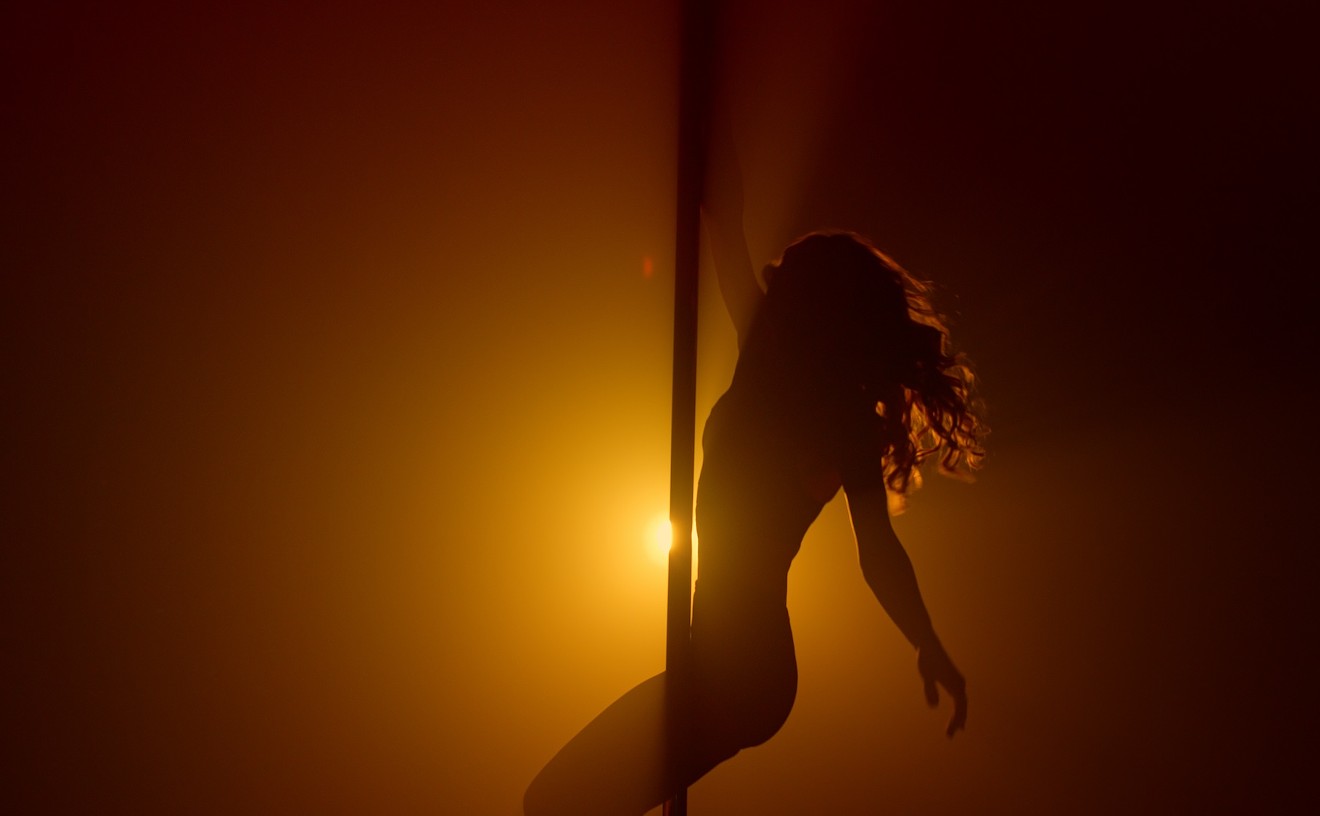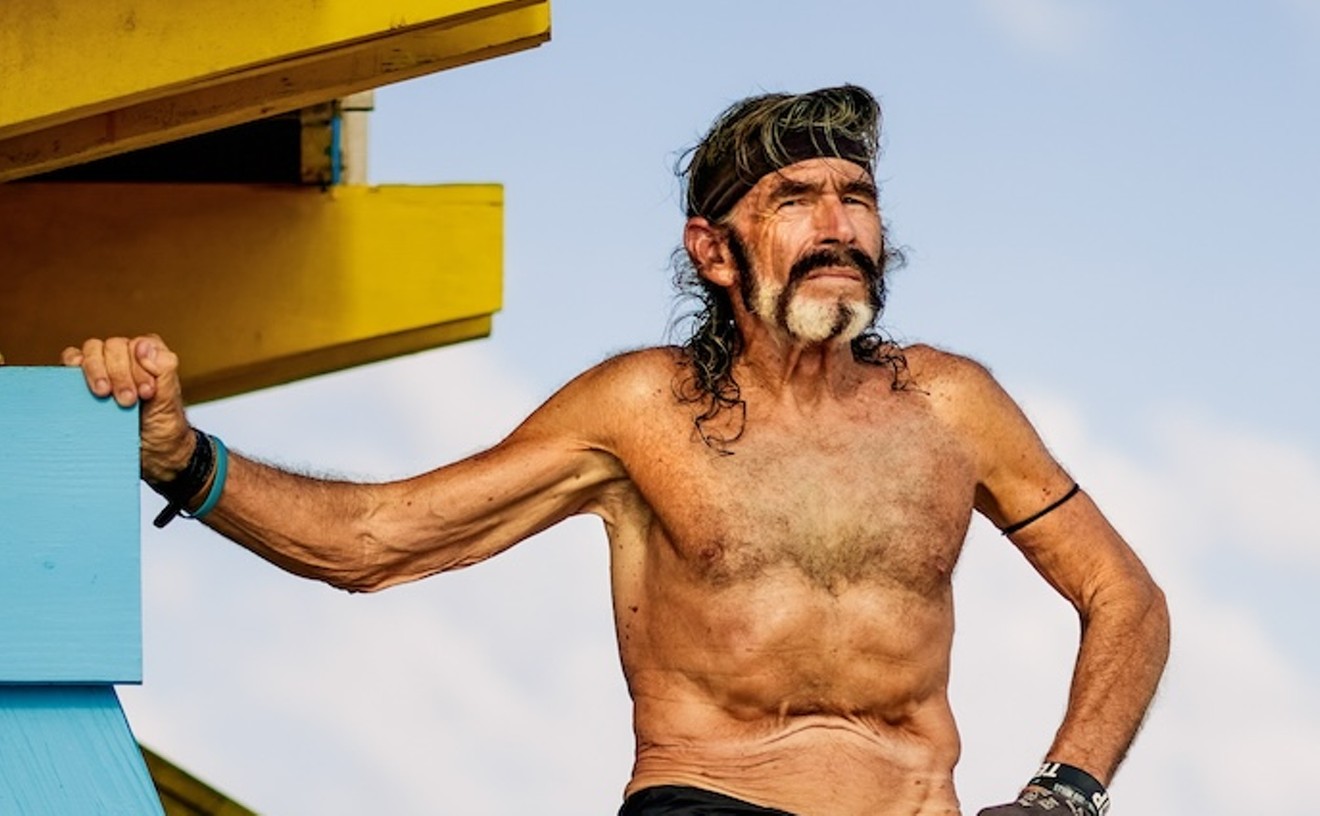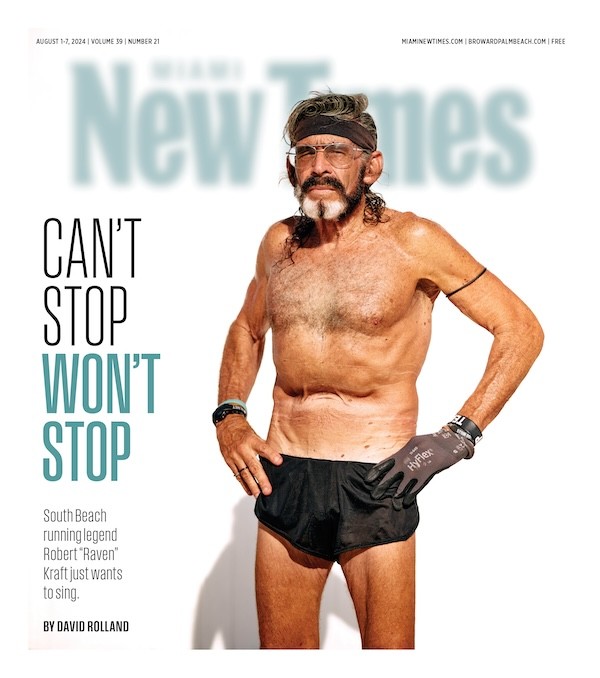Indeed the Grateful Dead, Jr., tag is an unfair one -- for the Dead as well as for Phish -- and a comparison based solely on a snapshot of the two group's similarly neohippie attired, VW bus traveling, set-list quoting fan base. Even a brief listen to Phish's actual music, though, reveals a gaping aesthetic chasm between the two outfits. For one thing it's hard to imagine the Dead ever launching into a barbershop quartet number. One of Phish's crowd-pleasing encore moves, it's the epitome of bourgeois whiteness, and the very thing from which the Dead were hell-bent on fleeing. But then Phish is a band that has never shied away from its middle-class suburban roots, which may help explain both the current size of its mass following, and why so many of the devoted (springing from the same social strata) chose to travel from all across America to spend four days in a swamp for their millennium celebration.
Guitarist/singer Trey Anastasio, drummer Jon Fishman, bassist/singer Mike Gordon, and keyboardist Page McConnell are musicians who came of age at the cusp of the Eighties within the liberal-arts college milieu of Burlington, Vermont, never feeling quite at home in any of the then-existing countercultures: punk, New Wave, jazz, or hippie revivalism. So they nipped pieces from each, carving out a "counter" counterculture, in the process creating a new audience in their own image. In the beginning this musical goulash often ended in a tedious rehash of Seventies prog-rock. The past few years, however, have seen a welcome shift toward Neville Brothers-styled mellow boogies and sprawling Krautrock jams (minus the Germanic angst) that rarely lose sight of their groove; crisp harmonics dominate, though wrapped in a dreamy gauze.
For those curious but unwilling to shell out the $60 for Phish's latest release, Hampton Comes Alive, a six-CD set that captures the band live in its entirety (warts and all) across two nights in Hampton, Virginia, last November, consider the more economical single disc Slip, Stitch, and Pass. Containing the highlights of an intimate 1997 club gig from Germany, Slip opens with an invitingly gooey take on the Talking Heads' "Cities," sliding into Phish's own "Wolfman's Brother," a tune that recalls peak-era Little Feat as Anastasio's liquid guitar work melts over the rhythm section's satisfying in-the-pocket crunch.
Still, even the band members themselves concede music is only part of their appeal. "It's a cult phenomenon, and it's a pretty cool cult phenomenon," explains Phish's Mike Gordon in an interview prior to the New Year's Eve concert. That may be the best way to approach Phish's runaway success: a $13 million gross for the group's millennium shindig, on top of the more than $90 million grossed over the last three years of incessant touring. Not bad for a band that has yet to have a radio hit, or even place a video into rotation on MTV. "The great thing about this band is that we value musical adventure as opposed to performance or an idle mentality," Gordon adds. "If we're having an experience, then the fans are having an experience with us. We're not playing at them. There's a feeling we're all in it together."
Driving into the Big Cypress Seminole Indian Reservation off I-75, the site for Phish's four- day blowout, the radio displays the disparate source elements feeding into the band's music, as well as the sense of humor tying them together. Located at 91.7 FM is Thin Air Radio, Phish's own pirate station broadcasting live from an on-site trailer. On Thursday afternoon, prior to the first of five sets Phish will play over the next two days (including a New Year's Eve midnight to sunrise set), DJs Pistol Stamen and Mr. Sparkle (a nod to a particularly bizarre Simpsons episode) flow through a wonderfully diverse mix. Music ranges from altrockers Sonic Youth and Mercury Rev, to rap standards from Public Enemy and the Beastie Boys, to vintage chestnuts from the Kinks and the Rolling Stones circa Exile on Main Street. Located in the heart of the Everglades' newest city, operating in the conscious shadow of Woodstocks '69 and '99, the DJs manage to maintain a black sense of humor about it all, a tone dramatized by Stamen's continual playing of sound bites from Gimme Shelter, the documentary of the notorious 1969 Altamont concert. Originally conceived as a replay of Woodstock's utopian peace-and-flowers vibe, Altamont ended as more of a symbolic denouement to that era, with Hell's Angels bikers (acting as stage "security") setting upon bewildered flower children with pool cues, eventually stabbing one concertgoer to death. Stamen repeatedly loops Altamont's headliner Mick Jagger halting the Stones midsong to deliver an effete, ineffectual plea to the crowd: "People please, who's fighting and what for?" It's clear that at least within the Phish organization itself, there are few doe-eyed illusions about either the New Year's concert or the Sixties legacy Phish labors under in the media. One might even take such an attitude to be downright ghoulish, or simply, a healthy response to a surreal situation, the cool component of a cool cult phenomenon.
In Thin Air Radio's trailer studio, Pistol Stamen and Mr. Sparkle are scampering back and forth, pulling records to spin and readying fresh batches of vocal samples from an adjoining computer. The two then flip through a bulging stack of index cards submitted by fans from across the campgrounds. They pass over some bad poetry, musical suggestions, messages to the band, and one loopy request: "I am shooting a 16mm film about Phish. Can I come backstage and get some footage ... and do you have a 16mm camera I can borrow?" Mr. Sparkle stops at one card that offers some Everglades safety tips for novice campers, turning on his microphone to read it over the air. "When being chased by an alligator, zigzag," he announces in a deadpan. "Alligators can run real fast in a straight line, but they can't zigzag. With the wild boars, though, you're on your own."
After cutting back into a record, Pistol Stamen discusses the spirit behind the station and its proudly unorthodox playlist. Originally conceived for Phish's earlier end-of-tour multiday campouts, the station was intended merely as an informational tool, an efficient way to transmit information to 80,000 people. It soon developed a life of its own, however, now with a full-time staff that traveled down from Vermont just to man the station around the clock. "Phish is all about improv," Stamen says, "which means if you're a fan, you're open-minded. I hope we're turning people on to new sounds, showing them where a lot of Phish's music comes from."
Thin Air Radio originally had planned to broadcast Phish's sets live, but squalling feedback between the station's transmitter and the band's onstage amplifiers has nixed that idea. While Phish plays, 91.7 FM goes off the air. To the vast majority of the assembled crowd, it's a nonissue. In the taping section, though, as word of the decision hits about an hour before showtime, there is a flurry of activity. Here in this gathering of about 100 behind the soundboard out in the concert field, Phish's music is distilled into an easily identified property: notes to be captured on tape. Accordingly this officially sanctioned patch of grass contains a forest of microphone stands, and a meticulous coterie fussing over thousands of dollars' worth of digital taping equipment. For those who were expecting simply to flick on their radios, push record, and then snag a perfect copy of Phish's show, the hunt is on for a sympathetic taper with microphones willing to let them patch their own gear into. The end result is a maze of daisy-chained tape decks. There's a sense of higher mission at work as well; copies of the tapes produced by this small body eventually will circulate out into the hundreds of thousands of Phish fans around the globe.
Of course the towering microphone stands also make for an easy landmark in the ever-growing sea of humanity filling the concert field, a fact taken advantage of by three young women splayed out on the grass alongside the taping section. Bridgett Courtot, age 20, and Norah Lycknell, 20 (both students at Northwestern University in Illinois) have hooked up with their high school pal Heather Desmond, 21. Although it's Courtot and Desmond's first Phish concert (Lycknell, with eleven shows under her belt, was the trip's instigator), right now they're more relieved than excited.
"It took us twenty hours to get from Columbus to I-75," recalls Courtot, who then begins shaking her head. "And then another twenty hours just to get across I-75!" At the moment, though, yesterday's traffic jam is a distant memory, and Desmond lays quietly on her back watching news helicopters circle overhead.
As Phish finally takes the stage shortly after 5:00 p.m., there's the obligatory roar and Desmond rouses herself. By the second song, a straightforward cover of Traffic's "Light Up or Leave Me Alone," most of the audience is only too happy to follow instructions and a flurry of pipes appear virtually everywhere. As the sun sets, however, a curious truth emerges. What is shaping up to be the nation's largest New Year's Eve rock and roll show has a decidedly unrock and roll feel to it.
Moving away from the stage, across the sweep of the concert field, reveals a scene that owes more to modern-day raves than secondhand memories of Monterey Pop. The crowd itself is as much a focus of attention as the four musicians performing, and rather than crush in to the front, thousands are happy to dance with one another nearly a half mile away.
At the foot of a brightly lit ferris wheel, Marcie Vogel, age 32, from Greenville, North Carolina, explains that while she's seen Phish more than 100 times over the past decade, the thrill is still there. "The first time was in a little bar in Baltimore with twenty people," Vogel recalls warmly. "The scene's gotten ridiculously large since then, but it's not mass media. It's about taking a friend. I've always dreaded the thought of them playing stadiums, but they've made it so everyone can still have an enjoyable time." Spreading her arms wide, motioning to the sheer expanse of the reservation, she exclaims happily: "I'm not smooshed! I'm going on a ferris wheel!" Overhearing her, Alison Morgan, 24, from Richmond, Virginia, chimes in: "Your world here can be as big or as small as you want it to be."
One of the few sour notes is sounded by Taz Courtnoy, 37, of Hammondsport, New York, who arrived with his girlfriend, Kristen Castnor, 22, and little else besides a batch of 50 hand-screened Phish T-shirts. The two had hoped to recoup their travel costs by selling the shirts, but instead found them confiscated as "unlicensed merchandise" by security at the entrance gate. Courtnoy fumes about the "Nazis" who "stole" his shirts for a moment, but then waxes philosophical on the loss. "It might have been hard to actually sell all of them," he muses. Gesturing to the crowd around him, he explains, "There aren't a lot of townies here, coming to check the scene out like on a regular tour stop. These people are the hard-core; they already have plenty of T-shirts." The parking lot, where guerrilla capitalism reigns supreme, bears out Courtnoy's prediction. Clothing, handblown glass pipes, and jewelry are all slow sellers. Instead the demand is for food, with lines snaking back and forth in front of jury-rigged kitchens serving homemade pizza, vegetable stir-fry, sandwiches of every imaginable stripe, and goo balls. Goo balls? Asking a goo ball vendor just what exactly "goo" contains elicits only a smile and the cryptic reply: "What do you think is in the goo?"
Marilyn Manson certainly would not approve, and anyone still clinging to cherished fantasies about the rebellious power of rock would most definitely feel chastened. There, boogying heartily on a suspended platform amid the scaffolding at stage right, are a cluster of crew members, production staff, friends of the band -- and Phish drummer Jon Fishman's fiftysomething parents. Mrs. Fishman gives up the ghost about halfway through the 90-minute third set, but Fishman Senior never flags in his frugging until the encore ends. "All the parents are here," he says, beaming as he exchanges a wave with his son, who's now exiting the stage. "We have special laminates," he adds with a laugh, referring to all-access passes that boldly read "Phish Parent."
"Be sure and get this in your article," quips Phish's Mike Gordon as he picks his way through the near-darkness surrounding the maze of trailers and pitched tents in an area adjoining the stage. "World-famous rock star in search of his wife!" It's 2:00 a.m. postshow; tomorrow is the big one, the midnight-to-dawn set. Right now Gordon just wants to find Priscilla, the missing wife in question, and adjourn to one of the many parties different cliques of crew and staff are throwing back at their RVs. The quest is taking him to concert areas that don't normally catch a glimpse of Phish this close up, and the results are unintentionally comic. After nearly tumbling into a ditch in the inky blackness, Gordon rights himself and then promptly steps on a tent's corner, summoning a surprised groan of pain from within. "Sorry! Sorry!" he mutters, shaking his head. One group of celebrating friends stops him, hands Gordon their camera, and asks him to snap their picture. It's only after he's taken the shot, handed back their camera and turned to move on that they realize just who the kindly cameraman was. Cries of "Great show!" and "It's the world's greatest bass player!" follow a now-increasingly uncomfortable Gordon, and he finally beats a retreat to his own trailer, where Priscilla has also arrived.
"It gets a little embarrassing to be looked at so much, but it's not harmful with our crowd," Gordon says. Still he looks visibly relieved to be inside now. Turning a radio on, he flips the dial to 91.7 FM. As the room fills with a wash of ambient house beats, he settles in on a couch next to Priscilla and reflects on Phish's musical evolution.
"In a jazz band, the bass player is often driving the beat with the drums dancing around. But in rock the bass and the kick drum are what everything sits on top of." He laughs and continues: "For us it took thirteen years to really embrace that concept. It's cool to have done it a different way, but I've always loved the sound of deeply grooving bass and drums. Trey [Anastasio] had the best sense of rhythm when we started. Trey's strumming was often a driving force, so we all got used to listening to him. It's interesting but it's not grounding for an overall sound. So by Trey laying back and not filling that role -- and me taking over more of that role -- it makes for a fuller sound. The top can float rather than be forced to drag the bottom along."
Of course when you spend night after night, year after year, playing largely improvisational music together, change is bound to occur, if only to keep things engaging for the musicians themselves. "There were times when he was touring for nine months straight," recalls Priscilla with a smile. "Then he'd come home and throw off my whole routine!" So is it hard for the couple to continually readjust between "normal" life in Vermont and the bubble world of the road? Both Mike and Priscilla pause and trade a knowing look. Then Mike suggestively arches an eyebrow and replies, "Which one is the bubble world?"











